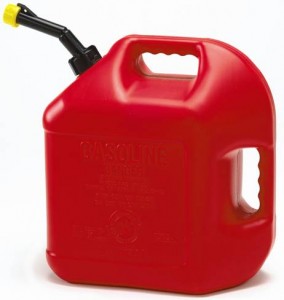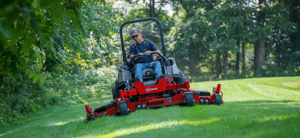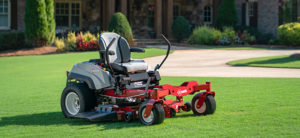
Many homeowners want to mow their own lawn, but they would like to spend less time mowing. If you fall into this category, you may be considering just buying a larger mower and being done with it. But mowing efficiently is about more than just speed and deck size. Here are some things to consider as you think about upgrading your mower.
How Much Mower Does Your Lawn Need?
Your lawn size and terrain, not the amount of time you want to spend mowing, should dictate your mower size. A good starting point for a medium-sized yard – an acre to an acre and a half — is a 42” mower. With a larger mower, you’ll spend a lot of time maneuvering into position and around tight corners. For homeowners with one and a half to three acres to mow, a mower with a cutting deck between 42” to 48” is a good size. Over three acres, you’ll want something larger.
Before buying a 72” mower for lawns greater than three acres, consider your terrain. Wide mowers perform best on flat, open ground. If your yard resembles a football field, a wide mower deck may be your best bet. However, if you have three acres of hills, dotted with trees and plantings, a wide mower may not be the right choice. Mowers that are too wide can scalp areas on uneven ground. A mower that’s too big will make mowing around obstacles, trees and shrubs more difficult.
If you have a large, hilly lawn, a mower with a smaller deck and a bigger engine may be the best option. You’ll be able to mow faster, without sacrificing precision or maneuverability.
What About Less than an Acre?
If you have between a quarter of an acre and a full acre, and are wanting a riding mower, you’ll want a deck under 40”, like a Quest zero-turn mower with a 36” deck. If your home is on an average U.S. lot (.35 acres) and you feel it’s too small for a riding mower, but a standard push mower isn’t working for you, consider a 30” self-propelled mower. It will cover a third more lawn on every pass, with less effort on your part.
Is My Yard Large Enough for a Wide-Area Mower?
For most homeowners, no. Wide-area mowers are designed for commercial use, especially for mowing parks, cemeteries, recreation fields and other wide, flat properties. If you run a residential lawn mowing service, you’ll need to calculate whether you have enough large properties among your mowing customers to make the expense a good investment. Getting the right size mower is critical, whether you choose a 42” zero-turn or a 30” self-propelled walk-behind. For help determining which size mower is right for your residential or commercial needs, your local Exmark dealer can help you figure out the best mower type, deck width and engine size.







